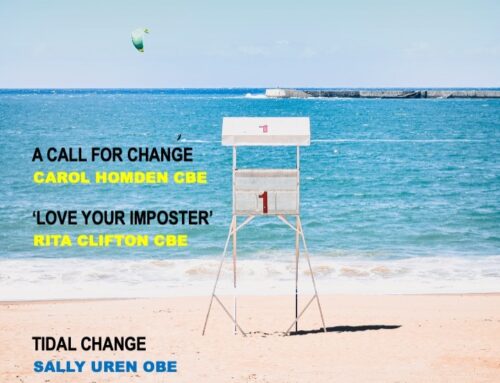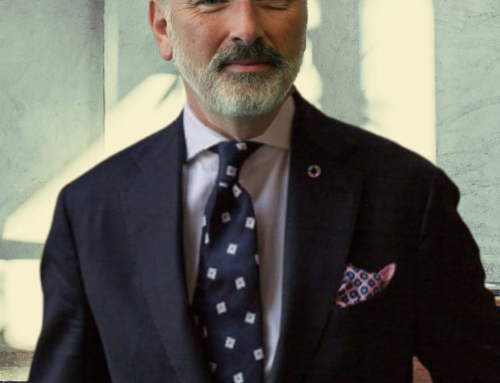Learning to love your ‘imposter’

If I were to tell you that the original title for my latest book ‘Love Your Imposter: Be your best self, flaws and all’ was actually ‘Naked and Unprepared’, it might give a flavour of the level of honesty and human flaws that I felt it was important to reflect. The book is about how we all need, now more than ever, every type of organisation to be run by people who bear a passing resemblance to the human race, with a lot of the quirks, insecurities and normal human emotions that might bring. That these human characteristics are actually what give us empathy and the ability to connect with others. We urgently need a change of chemistry at the top of businesses, institutions and politics and yes, that’s also a not very subtle code for saying that we need a much more diverse and balanced set of leaders to be running things too.
I don’t just mean being in senior positions either, having to persuade or cajole the final decision makers. I mean many more, and very different types of people being CEOs, Chairs, Director Generals, Presidents and Prime Ministers. Mixing it with other people who really run things too.
A (male) business acquaintance of mine recently commented on social media that most of the governments around the world that had been most successful in managing the coronavirus situation were headed by women (epitomised by Jacinda Ardern). He actually posted that ‘It’s time for women to begin to take over’. That was great, although I did post back that, as a first stage, I’d be happy with 50/50. The current stats are 93/7 (not in a good way).
Quite apart from the better reflection of society and qualitative fairness issue, the quantitative evidence for having many more diverse leaders in charge has been compelling for some time; the most recent research by Pipeline showed that FTSE firms with more diverse, gender-balanced leadership perform better and have higher profit margins. With only 5% of the FTSE 350 companies having a female CEO, for example…there’s, er, quite a lot to shoot for.
On gender balance, it is also interesting how many men agree that they’d like to see more balance in the world. My favourite bit of research for the ‘Love Your Imposter’ book was finding out that NASA astronauts positively enjoyed having more female astronauts on the teams; they believed it resulted in better language and better personal hygiene. Well, I think we’ll take that for starters. Boardrooms can be pretty dirty places too.
Clearly, there are many structural and unconscious biases getting in the way of more women and diverse candidates getting to the very top, but research also tells us that so many women and minorities lack the confidence and belief to go for it. For many cultural and chemical reasons, women tend to be more self-critical than men and yes, they are statistically more likely to suffer from ‘Imposter Syndrome’.
I say ‘suffer’, and many people obviously experience significant mental health issues – estimated to be around 1 in 6 people on a weekly basis in the UK; they need all the professional help and support that can be provided. For others, though, that nagging sense of ‘Imposter Syndrome’ – the feeling that you’re going to get ‘found out’, that you’re not really up to the job, despite evidence of success – is something that around 70% of people identify with; it’s a very common part of the human condition. If even half of those can learn to recognise, use and even try and make friends with that annoying imposter, it would be a good thing.
What I found interesting from some of the research was to see how many high-profile celebrities, successful business people and indeed politicians talk about their own imposter experiences. People like Tom Hanks, Michelle Obama, Emma Watson. Many mention how those feelings actually made them work harder, and try harder – they actually (even grudgingly) found them to be helpful drives to improve. The wonderful, multi-award winning actress Olivia Colman has talked poignantly about this, and the phenomenon that is Claudia Winkleman has even said “I don’t think [my imposter syndrome]’s a bad thing,” she said. “Imposter syndrome is incredibly useful.
So, applying that philosophy to our day to day lives and work, what I hope the book is saying that a) that having imposter feelings is a common part of the human condition and can even be used in a positive way, b) that the kind of empathy that recognition brings is important for the new types of leadership we need in the world and c) there are lots of tools, techniques and tips that can help make sure you’ve got the best chance of getting to the top. As you, yourself, not as some kind of corporate construct. Flaws and all.
From a personal point of view, I’ve certainly had my own imposter alive and kicking me pretty much my whole career, and I hope I’m bringing a level of honesty and practicality to describing some of my own stories and experiences (gratifying as well as mortifying) from working at, or with, some of the world’s leading organisations, as well as entrepreneurial start-ups and non-profits like WWF.
What to do about all this? Well, in order to be as confident, influential and ‘valuable’ as you might like to be for the long term, I have found it’s rather helpful to use the principles of strong brand thinking to apply to yourself – and your aspiring leadership brand – too. I am obviously not talking about the ‘Kardashian-isation’ of personal branding here. As with long term successful businesses, using disciplined and enlightened brand thinking helps give you longer term influence and value. Following principles like: how CLEAR are you about what you stand for, and your goals. How COHERENTLY do you make that clarity show up in everything you do – your skills, your knowledge, your communications and personal presentation, that reflects and does justice to your goals and aspirations. That means, if you want to end up running an organisation, then the language of the boardroom is, whether we like it or not, based on finance. If you can’t speak that financial language, you either won’t get to the Boardroom, or you won’t be as influential as you can be when you get there. As part of this, you need to be able to communicate and present yourself in a way that gives you credibility and engagement. (If you hate public speaking, btw, just worth considering Malcolm Gladwell’s book Outliers, where he talks about people needing to put in c.10,000 hours of practice to be really good at something! And finally, on brand characteristics, how do you LEAD your personal brand in a way that ensures you are constantly learning and developing? The important thing is to do this in a way that’s authentic and very human….and experiencing imposter syndrome, insecurities and vulnerabilities is an important part of being human! Again, embrace and use these feelings to be empathetic with others.
The world needs changing, business runs the world, so we need to change business, and the way it’s run. I hope that means you
Rita Clifton CBE
Rita’s latest book ‘Love You Imposter’ :
https://www.amazon.co.uk/Love-Your-Imposter-Flaws-Confident/dp/1789667003
& good bookshops
Rita’s website is here
& her personal leadership business
https://leaderbrand.co.uk/

Learning to love your ‘imposter’

If I were to tell you that the original title for my latest book ‘Love Your Imposter: Be your best self, flaws and all’ was actually ‘Naked and Unprepared’, it might give a flavour of the level of honesty and human flaws that I felt it was important to reflect. The book is about how we all need, now more than ever, every type of organisation to be run by people who bear a passing resemblance to the human race, with a lot of the quirks, insecurities and normal human emotions that might bring. That these human characteristics are actually what give us empathy and the ability to connect with others. We urgently need a change of chemistry at the top of businesses, institutions and politics and yes, that’s also a not very subtle code for saying that we need a much more diverse and balanced set of leaders to be running things too.
I don’t just mean being in senior positions either, having to persuade or cajole the final decision makers. I mean many more, and very different types of people being CEOs, Chairs, Director Generals, Presidents and Prime Ministers. Mixing it with other people who really run things too.
A (male) business acquaintance of mine recently commented on social media that most of the governments around the world that had been most successful in managing the coronavirus situation were headed by women (epitomised by Jacinda Ardern). He actually posted that ‘It’s time for women to begin to take over’. That was great, although I did post back that, as a first stage, I’d be happy with 50/50. The current stats are 93/7 (not in a good way).
Quite apart from the better reflection of society and qualitative fairness issue, the quantitative evidence for having many more diverse leaders in charge has been compelling for some time; the most recent research by Pipeline showed that FTSE firms with more diverse, gender-balanced leadership perform better and have higher profit margins. With only 5% of the FTSE 350 companies having a female CEO, for example…there’s, er, quite a lot to shoot for.
On gender balance, it is also interesting how many men agree that they’d like to see more balance in the world. My favourite bit of research for the ‘Love Your Imposter’ book was finding out that NASA astronauts positively enjoyed having more female astronauts on the teams; they believed it resulted in better language and better personal hygiene. Well, I think we’ll take that for starters. Boardrooms can be pretty dirty places too.
Clearly, there are many structural and unconscious biases getting in the way of more women and diverse candidates getting to the very top, but research also tells us that so many women and minorities lack the confidence and belief to go for it. For many cultural and chemical reasons, women tend to be more self-critical than men and yes, they are statistically more likely to suffer from ‘Imposter Syndrome’.
I say ‘suffer’, and many people obviously experience significant mental health issues – estimated to be around 1 in 6 people on a weekly basis in the UK; they need all the professional help and support that can be provided. For others, though, that nagging sense of ‘Imposter Syndrome’ – the feeling that you’re going to get ‘found out’, that you’re not really up to the job, despite evidence of success – is something that around 70% of people identify with; it’s a very common part of the human condition. If even half of those can learn to recognise, use and even try and make friends with that annoying imposter, it would be a good thing.
What I found interesting from some of the research was to see how many high-profile celebrities, successful business people and indeed politicians talk about their own imposter experiences. People like Tom Hanks, Michelle Obama, Emma Watson. Many mention how those feelings actually made them work harder, and try harder – they actually (even grudgingly) found them to be helpful drives to improve. The wonderful, multi-award winning actress Olivia Colman has talked poignantly about this, and the phenomenon that is Claudia Winkleman has even said “I don’t think [my imposter syndrome]’s a bad thing,” she said. “Imposter syndrome is incredibly useful.
So, applying that philosophy to our day to day lives and work, what I hope the book is saying that a) that having imposter feelings is a common part of the human condition and can even be used in a positive way, b) that the kind of empathy that recognition brings is important for the new types of leadership we need in the world and c) there are lots of tools, techniques and tips that can help make sure you’ve got the best chance of getting to the top. As you, yourself, not as some kind of corporate construct. Flaws and all.
From a personal point of view, I’ve certainly had my own imposter alive and kicking me pretty much my whole career, and I hope I’m bringing a level of honesty and practicality to describing some of my own stories and experiences (gratifying as well as mortifying) from working at, or with, some of the world’s leading organisations, as well as entrepreneurial start-ups and non-profits like WWF.
What to do about all this? Well, in order to be as confident, influential and ‘valuable’ as you might like to be for the long term, I have found it’s rather helpful to use the principles of strong brand thinking to apply to yourself – and your aspiring leadership brand – too. I am obviously not talking about the ‘Kardashian-isation’ of personal branding here. As with long term successful businesses, using disciplined and enlightened brand thinking helps give you longer term influence and value. Following principles like: how CLEAR are you about what you stand for, and your goals. How COHERENTLY do you make that clarity show up in everything you do – your skills, your knowledge, your communications and personal presentation, that reflects and does justice to your goals and aspirations. That means, if you want to end up running an organisation, then the language of the boardroom is, whether we like it or not, based on finance. If you can’t speak that financial language, you either won’t get to the Boardroom, or you won’t be as influential as you can be when you get there. As part of this, you need to be able to communicate and present yourself in a way that gives you credibility and engagement. (If you hate public speaking, btw, just worth considering Malcolm Gladwell’s book Outliers, where he talks about people needing to put in c.10,000 hours of practice to be really good at something! And finally, on brand characteristics, how do you LEAD your personal brand in a way that ensures you are constantly learning and developing? The important thing is to do this in a way that’s authentic and very human….and experiencing imposter syndrome, insecurities and vulnerabilities is an important part of being human! Again, embrace and use these feelings to be empathetic with others.
The world needs changing, business runs the world, so we need to change business, and the way it’s run. I hope that means you
Rita Clifton CBE
Rita’s latest book ‘Love You Imposter’ :
https://www.amazon.co.uk/Love-Your-Imposter-Flaws-Confident/dp/1789667003
& good bookshops
Rita’s website is here
& her personal leadership business
https://leaderbrand.co.uk/




